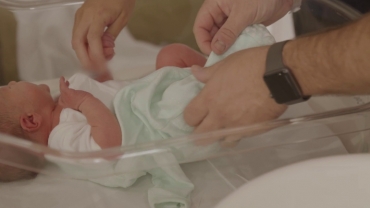Each year in the US nearly 1 in 9 babies are born pre-term, meaning less than 37 weeks of pregnancy, or more than 3 weeks prior to the expected due date. That's nearly half a million babies every year born too early in this country. Here to discuss preterm birth and provide guidance to women who might be at risk for preterm birth, is Dr. Aaron Deutsch from Boynton Beach, FL, who is a specialist in maternal fetal medicine.
What is preterm birth?
Aaron Deutsch, MD, Maternal Fetal Medicine Specialist: So, first off, preterm birth, we have to understand what term birth is, and when a woman is given her due date of 40 weeks gestational age as full term, term is considered 37 to 40 weeks, so if a woman delivers earlier than 37 weeks, that's pre-term. The reason why it's so important is pre-term birth is the leading cause of neonatal death, also associated with a high risk of medical complications, and there's a financial impact on the health care system with that, as well. What most people don't realize is how common pre-term birth is. It occurs in almost 12% of all pregnancies.
So, the goal is 40 weeks, or full term. So, what can happen, doctor, when a baby is delivered pre-term.
Aaron Deutsch, MD, Maternal Fetal Medicine Specialist: Well, first off, you're absolutely right, and that's what I think women should focus on, is a goal of 39-40 weeks, and there's multiple medical studies that show that babies born after 39 weeks have the best outcomes. But if the baby is born premature, there's a host of medical problems associated with that. Essentially, every organ system in the baby can be adversely affected. Now, the earlier a baby delivers, the worse the risks and longer term problems, but anything from the brain, the lungs, the intestines, infections, long stays in the hospital, so the goal is try to stay pregnant as long as possible till your due date to minimize these risks.
So, let's say, right now, I'm sure we have so many women out there who are pregnant, and they wonder "well, are there any risk factors that I should be aware of?" Are there?
Aaron Deutsch, MD, Maternal Fetal Medicine Specialist: Now, many preterm births are unexpected and can't plan for, but there are specific risk factors that are associated with a higher risk of preterm birth. One of the most important things for all pregnant ladies is to establish their prenatal care early with their health care provider. Get in with them, have a discussion about their medical history, their obstetric history to find out if they have any of these risk factors. One of the biggest ones would be having delivered preterm previously. So, having had a baby preterm, puts you in about a 15 to 30% of having that recur in the next pregnancy. If you've had two babies preterm in a row, your risk can be as high as 60% in the next pregnancy. So, very high. That's probably your biggest risk factor. Other risk factors, things like multiple gestations, which would be twins or triplets, cervical problems, a short cervix, certain medical complications and there are socioeconomic factors that kind of play into it also.
Now, I gotta tell you, when it does happen, when there is a preterm birth, I've seen such progress, remarkable progress, especially in the neonatal intensive care unit. Let's talk about that progress today.
Aaron Deutsch, MD, Maternal Fetal Medicine Specialist: I would say some of the biggest accomplishments in the medical field have been caring for these premature babies, and it's true. Babies are born at earlier gestational ages surviving longer than they ever had before and the capabilities in the neonatal intensive care have improved to the point that the medical problems are much less now. I would say the key point, though, is there are still problems, even now with the capabilities that they have, and some of these can be life long, so the goal would be to have the baby maturing inside, in the uterus, getting bigger, developing, close to that due date, after 39 weeks, to minimize any risk of having to use the great facilities and the neonatal intensive care unit.
So, quick question here, in your opinion do many pregnant moms know that their baby's growth and development continues even after the latter part of their pregnancy?
Aaron Deutsch, MD, Maternal Fetal Medicine Specialist: Yeah, I would say most people tend to have a general appreciation that it's better to stay pregnant as long as possible, but what I think is underestimated is the risks even having a baby several weeks early, and the impact that can have. Now, also importantly, there are certain indications where babies are purposely delivered pre-term, and that would be called an indicated pre-term birth, where there's a medical complication, mom has diabetes or high blood pressure, there's a problem with the growth or development of the baby, a placental problem. These rare instances, we would prefer to deliver a baby preterm, but aside from these occurrences, the goal for every woman should be getting to that 39-40 week time frame.
I know your son Gabriel was born five weeks early?
Kate (Gave birth to preterm baby boy at 35 weeks): Yes, I had a normal pregnancy up until 34-weeks. My water broke. Totally unexpectedly, and I was admitted to the hospital and had him 8-days later, at 35 weeks, which is 5 weeks too early. I was totally unprepared for that. I didn't know anything about it. My expectations were really kind of shattered as to how my delivery was going go. I was expecting a really joyful time, and it was really serious. I didn't even get to hold him right away after he was born. They kind of wisked him away and the extra NICU doctors had to check him out and make sure he was alright.
Lynn, tell me your story, please with your son, Lamar, right?
Lynn (Gave birth to preterm baby boy at 36 weeks): Yes, Lamar. When I was pregnant with Lamar, I went to the doctor for my regular visit and I was telling about these pains I was experiencing, and she told me no those are contractions, so she sent me over to labor and delivery and I got a little excited seeing the little crib in the room with me, and I thought my son is going to come early, this is a great thing. But, then she warned me that if he was born this early he would end up going to NICU. Eventually, he was born 4 weeks too early.
Doctor, I'm hearing these two stories. They're quite common. Typical circumstances?
Aaron Deutsch, MD, Maternal Fetal Medicine Specialist: Absolutely. Things that a typical obstetrician would deal with on a daily or weekly basis are stories just like these. You can see how it really kind of turns the life of the family upside down, so certainly things that commonly happen here and having a pre-term birth can really change things.
Kate, I was telling the doctor earlier, I don't know if you heard, but my children came two weeks early. For me, that was just, I was a wreck. Tell me about your emotions at that moment.
Kate (Gave birth to preterm baby boy at 35 weeks): It was definitely scary for me. Once I kind of was clued in to this is a serious situation, I was just totally unprepared for that emotion. I wasn't expecting that at all.
Your emotions at that moment when they told you Lamar is coming?
Lynn (Gave birth to preterm baby boy at 36 weeks): When Lamar got here, he seemed perfectly fine, and I was very excited. I thought I would be able to take him home, but while I was in recovery, he started having issues holding his temperature and being four weeks too early, he wasn't able to suck quite well, so he ended up spending 19 days in the NICU. It was really challenging. We were excited to take him home, but instead had to take all that time in the hospital, and it was, you know, not the experience that you want for your first child.
And doctor, let's be honest, having a child is stressful, and after you deliver, there's so many changes in the body, I can only imagine when you have a preemie, it's even more.
Aaron Deutsch, MD, Maternal Fetal Medicine Specialist: A full-term healthy newborn is stressful enough. And then dealing with the questions of the health of your baby, the consequences of having a baby preterm, visiting your baby in the hospital rather than coming home with you, so huge huge stressors, not to mention a financial impact. Medical bills add up of having a baby in the NICU, and people don't realize the stress that that could have on the family, certainly.
Doctor, any closing thoughts for anyone out there right now that could be carrying a child right now, thinking of having one?
Aaron Deutsch, MD, Maternal Fetal Medicine Specialist: I would say the first thing, which I mentioned previously, is most importantly getting in early to see your health care provider. Determining if you have risk factors for preterm birth, particularly if you've had a prior baby born preterm, the importance of letting them know. The other thing which I think is really important is the signs and symptoms of preterm labor, which certainly can lead to preterm birth, so if a woman is having contractions, bleeding, leaking water like her water broke, let your health care provider know early, to get in to be evaluated.
- 4188 views













